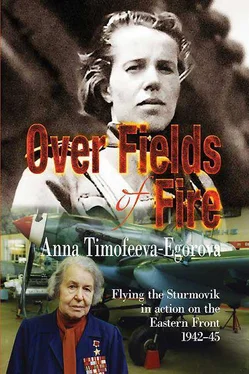On one day of combat, awaiting the order to fly, the pilots lying back on the ground in the ‘sun’ pattern (a circle, head to head), were just about to tell each other funny stories in turn. If it was not funny the unlucky author would get a flick on the nose. This was in its way a psychological relaxation. Everybody grew hungry because of idleness but lunch was late, and we were casting our eyes to the road leading to the village from which the catering service girls were supposed to bring us lunch.
“They’re coming!” Vasya Kosterov, a sturdily built Moscovite yelled, being the first to notice the battalion’s ton-and-a-half truck. But at the same moment a messenger ran up from the CP and announced: “Combat crews, to the regiment commander!”
Forgetting about food we rushed to the headquarters dugout. Lieutenant-Colonel Kozin in his blouse with decorations on it, his head bare, stood at the table. His fair wavy hair was combed perfectly and it seemed he had just come from the barber’s shop: a light wind blew us the smell of cologne. This time his faithful pipe lay on an ash-tray — a flattened shellcase. And Michael Nikolaevich began to explain us unhurriedly the oncoming combat mission: “Many trains of enemy troops and materiel have concentrated at the Salyn railroad station on the Kerch Peninsula. Your task is to bomb and strafe them so as not to let the Hitlerites shift them across the Kerch Strait to Taman. I appoint pilot Usov the leader. Let’s think over and plot the route of your flight together. It seems to me we ought to do a low-level flight over the Azov Sea, dart out over the station and make a sudden strike…”
We discussed the oncoming sortie, and when the flare soared above the aerodrome we taxied out to the start point and took off one after another. The escort fighters — a sixer of LaGG-3 type — took off after us. Approaching the Azov Sea we began to descend, and at this moment the Hitlerites opened fire at us with the shore batteries. Captain Pokrovskiy’s plane flared up before my eyes and crashed into the sea in flames. It seemed to me that for an instant our group even slowed down, but then the wingmen caught up with the leader and we rushed forward, towards the target.
“My God! Why him?..” The appeal to God, learned by heart in childhood, burst out of me.
Tit Kirillovich Pokrovskiy… A fearless pilot, an honest and gallant man! He joined our regiment as an established combat flyer, with three Orders of the Red Banner. He had got his first Order for fighting near Lake Khasan, 111 111 Translator’s note — a lake in the Far East of Russia; in the summer of 1938 there was a border clash between the Soviet and the Japanese armies there.
his second, in Spain, the third, at the very beginning of the Great Patriotic War. Everyone had been surprised by the appointment of the captain as a flight commander. “A pilot like that, and only a flight commander?” his brother-officers grumbled. Pokrovskiy was older than all of us, born in 1910, and we began to call him just ‘Kirillych’ 112 112 Translator’s note — a colloquial form of Kirillovich, his patronym.
as a sign of respect. Sometimes he would relax and tell the airmen funny stories that ostensibly happened to him, and we would laugh. But more often he was tight-lipped and would shrink into his shell for long periods. Once after dinner at an aerodrome near the Popovichevskaya station we organized a dance. Pokrovskiy was sitting very sadly and wouldn’t talk to anyone. Then I approached him and invited him for a waltz.
“Thanks, Egorushka 113 113 Editor’s note — a diminutive made by transforming the author’s last name to male first name.
. Let’s go for a walk instead”, Kirillych said. I agreed, and we walked off. The evening was warm, the moon was shining. We headed along the stanitsa , and then the captain told me his story. When he was shot down for the ninth time at the end of 1941, there were no more planes in his regiment. Five or six pilots remained, and they were sent to a training regiment (UTAP) to learn to operate new planes. However, no new planes were found there either.
All the ‘horseless’ pilots without exception were eager to get back to the front. They didn’t want to be idle during such a hard time for the motherland, and Tit Pokrovskiy tried harder than the rest to be sent to the front (to any combat arm!). He approached the commissar of the UTAP and had his say about this sore point that was eating at many of them. The pilot, of course, lost his temper, and the commissar immediately sent him to the osobyi otdel 114 114 Translator’s note — a special political section in the Soviet Army’s units largely involved in political control over the servicemen.
to sort him out…
The osobist 115 115 Translator’s note — osobyi otdel officer.
gave Pokrovskiy a good talking-to, like an interrogation, for minutes, arrogantly, rudely. And then Kirillych called the osobist “a parasite sniffing for easy ‘prey’ among the airmen” — “You earn decorations during interrogations and hide from the front!” the pilot said furiously. The osobist silently closed his folder with the unsigned minutes and left. Pokrovskiy was arrested, then he was court-martialled and sentenced to be shot for “shunning frontline service and for anti-Soviet propaganda”. There was indignation and outcry in the regiment. Immediately after his arrest his pilot comrades went to a post office straightaway where they talked a young telegraph-girl to send an urgent telegram to the Chairman of the Supreme Council of the USSR himself. The telegram arrived in time and at its destination. Pokrovskiy was rehabilitated with the return of his rank, Party membership card and decorations. After all this horror Kirillych was assigned to our 805th Ground Attack Aviation Regiment.
And now Tit Kirillovich was no more… After his death we lost the escort fighters too: apparently an aerial battle had broken out somewhere high up. Some time later our group crossed the coastline and darted out not over the Salyn train station but over the enemy’s Bagerovo airfield. About thirty or more twin-engine bombers with crosses were lined up down there refuelling. Messerschmitts were already taking off along the airstrip towards us. The group leader Pavel Usov opened fire at them without hesitation.
“Smash the bastards!” Pasha 116 116 Translator’s note — a diminutive for Pavel.
was yelling into the air. And we, his wingmen, struck at the Fritzes with everything we had. Usov set ablaze two Messerschmitts that hadn’t managed to get into the air, and we kept strafing the bombers’ parking bays with long bursts. After raking the aerodrome we gained altitude, and shot over to the Salyn Station straightaway. We dropped bombs on the trains of materiel and enemy troops and headed home across the Kerch Straits.
Several days later reconnaissance reported we had done a great job at the Bagerovo airfield and the Salyn station. We had indeed done well, but we had lost five crews…
I remember the mechanics rolling up the covers of the planes that had not made it home — as if they were shrouds. And before my eyes my comrades were still falling into the sea and onto the ground… I climbed out of the cockpit without taking off my parachute and helmet with its earphones, jumped down on the ground and ran away from the parking bay. Unable to contain myself any more I fell on the ground and burst into tears.
“You’re really tired, Egorova, aren’t you?” I heard the regimental commander’s voice above me. “Have a rest, calm down. I haven’t included you in the next combat sortie group.”
“No, I’m flying!” I jumped to my feet. “And, please, don’t make any exceptions, don’t insult me!”
Читать дальше












